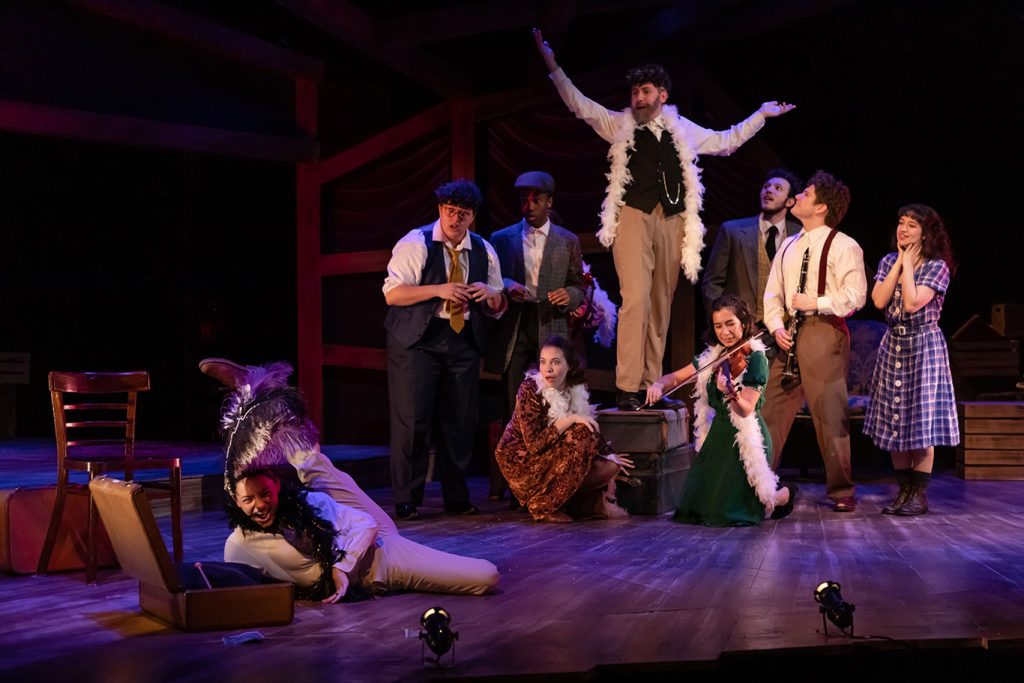
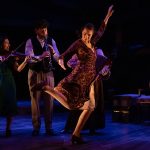
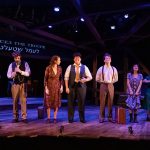
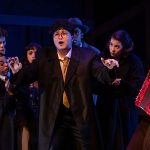
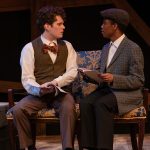
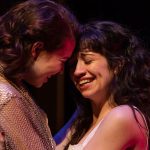
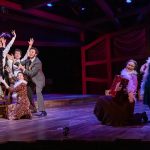
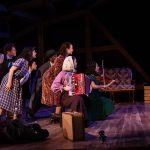
Indecent, the third production in Fordham Theatre’s mainstage season, is a Pulitzer prize winning play about the true story of the staging of another play—God Of Vengeance, by Sholem Asch.
God of Vengeance was written in 1906 in Yiddish, and after great success in Europe, it was translated into English, and performed on Broadway in 1923. The plot, which revolves around a love story between a woman prostitute and the daughter of a brothel owner, did not sit well with the authorities, however, and Asch was arrested.
Director Julie Kramer, who made her Fordham debut when the curtain on the production rose on Feb. 23, was moved by Indecent when she saw it on Broadway in 2017, but didn’t realize just how relevant it is to the current climate.
“What’s stunning about God Of Vengeance is how modern it feels. The way it portrays two women; it’s just stunning. I’m older than the students, but I still think of when it starts, in 1906, as being so long ago,” said Kramer, is helming the production as a guest director for Fordham Theatre.
“Then you read this, and you realize that this play was a huge hit all throughout Europe. It’s both fascinating and discouraging the ways that we sort of have to keep fighting for the same battle of representation and truth telling.”
The students have shown not only to be talented and dedicated, but also very connected to the show’s material, she said. The response from the audience has also been heartening.
“It is fascinating to me watching the play in the audience with so many students,” she said.
“In the very beginning, the playwright’s wife says ‘It’s the 20th century, you know? Everyone’s attracted to both sexes.’ It gets a huge laugh, which surprises me. But I think there’s something just incredibly delightful and surprising to this audience hearing that people fought about that in 1908.”
Indecent finishes with three more performances from March 2-4.
]]>“I was struck by the diversity of projects featured, but what most impressed me was the creativity and resilience of our students, several of whom had to reinvent their projects in the face of pandemic restrictions,” said Stark-Gendrano. “It was inspiring to see such good work come out of such challenging conditions.”
From combating global warming to undermining misogyny to embracing immigration to parsing gender identity and sparking the attention of boys with ADHD—the ideas of graduating seniors and their undergraduate peers filled four days of sessions on Zoom.
This Land is Her Land
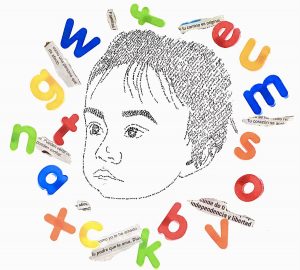
Senior Selena Juarez-Galindo, a visual arts major, presented her multimedia work in a project titled “Exploring my Mexican Family History through Art.”
“My family are all basically undocumented immigrants and I am the first generation,” Juarez-Galindo said, noting that since she was born in the U.S. she has full citizenship.
Juarez-Galindo’s family is from a town called Guerrero, where people native to the land still speak Mixteco, a language that predates the Spanish conquest of Mexico. The intention of her artwork is “to chase a native narrative” and portray distinct images of her family’s culture and show others that it’s not unlike their own.
She noted that her required courses in theology deepened her understanding of the plight of her family and the struggles faced by immigrants and refugees.
“When it comes to immigrants here, there has to be a kind of morality that’s above the law, especially when American nationalism can create really horrible effects,” she said of the consequences facing people crossing the border, such as separating children from their parents. “There have been so many immoral things in history that were legal, such as slavery. Our morality has to come first.”
Keeping Boys’ Attention During Online Programs
Senior Arbi Kumi, a psychology major, has always been interested in what makes the mind tick, though he had never concentrated on the mind of a child. His study, “Exploring the Feasibility and Effectiveness of a Virtual Summer Treatment Program for Children with Behavioral and Social Problems,” sprang from an internship at the Child Mind Institute, a mental health nonprofit clinic for children. There, he was assigned to a virtual summer camp for boys with ADHD. With permission from the institute and from parents, he studied how boys’ attention improved and/or degraded during a virtual adaptation of a summer camp program. Instead of five days a week at six hours a day, the program ran for just two hours a day for five days a week. The boys, who worked in peer groups, showed substantial gains during treatment that sought to improve their social skills over the course of the program, he said.
“We knew anecdotally that screen fatigue was a problem and it might not be interesting enough to keep the boy’s attention, so online games like Fortnite, Minecraft, and Roblox were used as a reward and something we could use to teach them new social skills,” said Kumi.
By using parental surveys and a point system administered by camp counselors, Kumi found that post-treatment levels showed significant improvement in social skills, including group discussions, helping or being flexible, and sticking to a plan—particularly with peer support. However, he said, certain problem behaviors, such as interrupting, did not improve. Beyond the findings, Kumi said that he learned a lot about his own perceptions of children.
“It was so much fun; this one boy had a new nickname for me every day, he was so funny, so smart,” he said. “I also realized how much stigma is placed on mental health as opposed to physical health.”
Delving into Arabic LGBTQ+ Identity in NYC
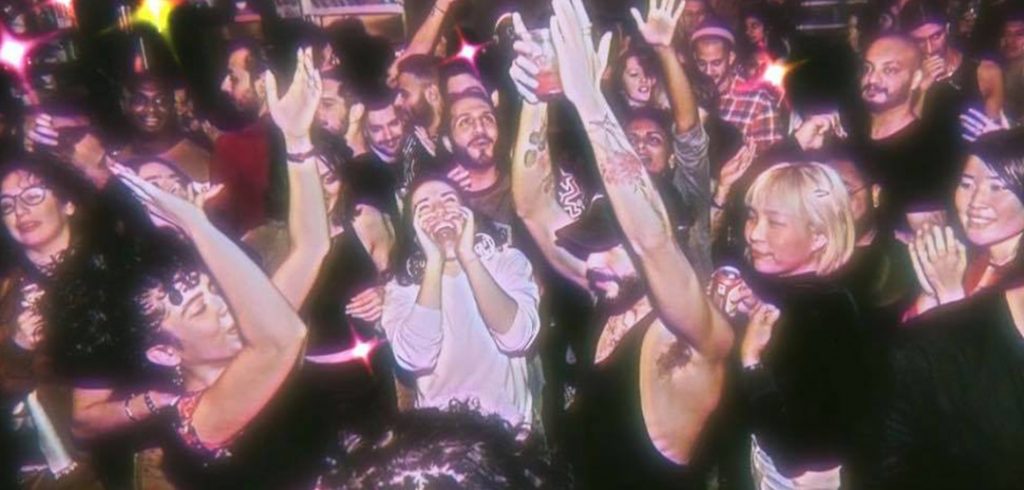
Senior Batool Abdelhafez, who goes by the pronoun they, majored in anthropology and psychology. For their project titled “Identity, Duality, and Kinship Among LGBT Arab-Americans in the American Diaspora,” they interviewed 15 members of the LGBT+ Arab American community and the Southwest Asian and North African community (SWANA). They set out to find what gave people in the group a unique sense of personhood, and in what spaces the group felt free to be true to themselves. Lastly, they sought to define whether LGBT+ Arab American and SWANA individuals consider themselves to be a separate subculture from the LGBT+ community at large.
“The emergence of colonialism demonized and categorized LGBT+ Arabs as something to be duly exoticized, but also viewed as somehow degenerate, backward, or uncivilized,” they said. “We see this context even today just for Arabs in general, right? But it’s even more so for LGBT Arabs.”
They noted that all their subjects were proud of being LGBT+, which helped them dissect layers of identity that included class, national identity, and being LGBT+ in New York City. Their study found that all subjects expressed sentiments about being racialized, being discriminated against, and feeling exoticized. The group’s experiences were unique enough that a community separate from the LGBT+ community has formed, they said. They spoke of a burgeoning scene expressed in art, music, and culture at nightclub parties such as Yalla! and via community groups, such as Tarab NYC.
Teenage Girls on the Verge
Senior Gillian Russo majored in journalism. Her presentation, “Women Of Mass Destruction: Power, Violence, and the Supernatural in Teenage-Girl Theatre,” examined four recent plays that combine violence and witchcraft as perpetrated by teenage girls. The plays were produced and directed by women and non-binary artists. Russo asserted that the plays shocked audiences with an uncomfortable truth that teenage girls—”the last group you’d expect to be violent”—could also be viewed as “natural partners” to horror.
Russo chose the plays because she saw a trend developing between magic, witchcraft, and teenage girls in the theater. She also noted that the plays took on societal views of women more broadly. Too often media employs the catty girl trope, she said, and ignores the depth of adolescent emotion that could rise to the level of theatrical violence.
“Most girls aren’t necessarily this violent in real life, but in the elevated world of the theater you can go to extreme examples,” she said. “What better way to drive that home than putting it live on stage in front of you, and showing the most extreme thing that a girl can do, like violence, so she can lead her own charge for self-recognition and self-realization?”
Going Rooftop Green
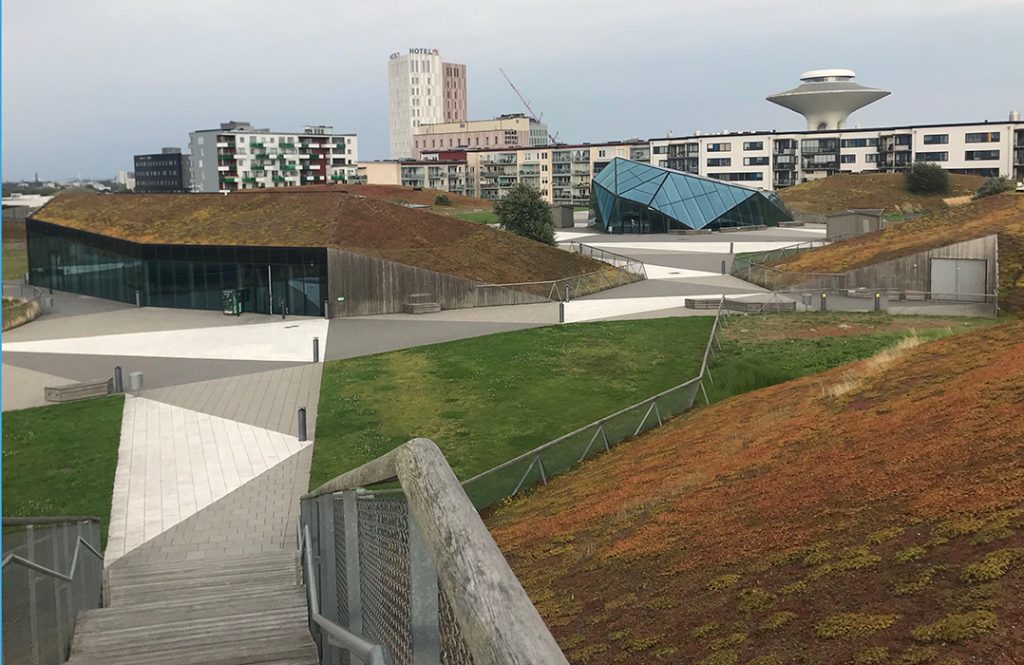
Lydia Hallett, a senior majoring in environmental studies, presented on “The Cost-Benefit Analysis of Urban Green Roofs.” After studying abroad in Sweden, Hallett saw a proliferation of green rooftops there and decided to conduct a cost-benefit analysis of green rooftops in New York. She found herself with more questions than answers.
“In my research that I wanted to understand these kinds of large solutions, and what it actually means for a city to take that on,” said Hallett.
Hallett identified public benefits that green roofs provide, including stormwater management, biodiversity, and improved air quality. However, she also found that high up-front installation costs often overshadowed returns on investments for most developers.
“No one wants to put a price tag on nature, but that’s kind of what has to be done for order in order for people to understand the benefits of green roofs,” she said.
]]>
This fall, the One Flea Spare Project brought together faculty and students from five universities—Fordham, the University of Massachusetts Amherst, Princeton University, Georgetown University, and SUNY Purchase—for shared projects, workshops, and classes, based on themes raised in the play. Set in London at a time when the city was beset by plague, the play revolves around a wealthy couple who is preparing to flee their house but are instead forced to quarantine for 28 days with two strangers who’ve snuck into their home.
In November, One Flea Spare’s creator, Naomi Wallace, participated in a webinar for the project for all of the universities involved, and this semester, she led a two-week playwriting workshop connected to the playwriting class that Fordham’s Daniel Alexander Jones teaches.
“What’s so brilliant about Naomi is that she has meditated on the human condition, and how we behave when we’re in quarantine, particularly around our own mortality and how relationships change when death is literally at your door,” said Ramos, noting that the interdisciplinary nature of the project expanded the reach of theater education.
“It was just an obvious choice. Everything in the play sort of parallels what we’re going through now.”
Beyond Theater Classes
The concept behind the project was simple. If a professor was teaching an online class in any discipline that addressed how plagues and pandemics affect literature and art, they could open it up to any student attending the participating universities. A student at Fordham could attend The Great Work Begins: Revisiting Angels in America During a Pandemic, which was offered at Georgetown in the fall, while a student at SUNY Purchase could attend Texts & Contexts: Plagues and Poxes, a course taught by Fordham’s Rebecca Stark-Gendrano, Ph.D. Professors were encouraged to include One Spare Flea in the syllabus for their classes; the majority of them did so.
This semester, the project’s major focus has been A Passage in Relief, a collaborative, virtual theatrical response to One Flea Spare being spearheaded by Princeton University’s Elena Araoz that will take place on April 26.
Wallace, who participated from London, called the project exhilarating.
“How students, artists, and writers read and see and perform my work is an education and a delight,” she said.
‘Imaginative Solidarity’
“One of the things that the One Flea Spare Project at Fordham inspired me to do was reformulate my theories about teaching and writing, as with the idea of ‘imaginative solidarity,’” Wallace said.
“Imaginative solidarity” was the focus of Wallace’s recent virtual workshop, which brought together students from the five universities on March 25 and April 1. She described it as a process of engaging in a dialogue with history and uncovering “the workings of U.S. racial capitalism and its long and ugly history of colonial dispossession and racial slavery.”
“This is about challenging our imaginations to break down the binaries between domestic and ‘foreign’ events, between what is happening in the United States and what our government is up to elsewhere,” she said.
Daria Kerschenbaum, a Fordham College at Lincoln Center senior majoring in English and theater, said the workshop helped her with her final project, a play about Edgar Allen Poe’s child bride, Virginia.
Acknowledging the Ghosts of History
As part of the workshop, Wallace asked students to research recent U.S. military campaigns; Kerschenbaum was tasked with researching the 1986 bombing campaign of Libya. Key to the exercise was exploring a sense of empathy for those who were on the receiving end of the bombs.
“I think talking with Naomi gave me a good perspective about how empathy is so important to creating diversity in entertainment,” said Kerschenbaum, who is in Fordham Theatre’s playwriting track.
“Social justice is remembering the ghosts of what has happened in our country and being able to acknowledge them and be in dialogue with them,” she said.
Kerschenbaum collaborated with Percival Hornak, a first-year graduate student at UMass Amherst who is supervising the construction of an interactive “lobby display” that can be viewed before and after the presentation of A Passage in Relief.
Expanding Community During Isolation
Hornak said a play about plagues gave him pause at first but collaborating with students at other universities has been very fulfilling.
“This past year, I’m not encountering as many people as I would; just people I’m in class with and people I work with. It’s been really nice to expand the people I interact with and embrace all these different universities’ approaches to teaching and to making theater,” he said.
The project was funded by an Arts and Science Deans’ Faculty Challenge Grant” for $9,703, but the job of pulling it all together fell to Emma McSharry, a senior pursuing design and production in the theater department.
“It’s been a lot of logistics, which is more difficult over Zoom and email, but that’s what I’ve been trained to do for the last three years, so I was ready,” she said laughing.
Ramos said the success of the project proved that people are really interested in reaching out to others, and he said he hopes that energy doesn’t dissipate when life begins to return to something resembling the past.
“There was an openness during the pandemic that I don’t think we’ve experienced before, and I think there’s a sense that when we come back in the fall, we’re all going to go back indoors and, in a way, we will be subject to those walls again,” he said.
“This confirmed that everyone really needs community.”
]]>
On Aug. 26., in response to the COVID-19 pandemic and the state restrictions on mass gatherings, fall classes at the University commenced under the auspices of a brand-new flexible hybrid learning model.
The model, which was laid out in May by Dennis Jacobs, Ph.D., Fordham’s provost and senior vice president for academic affairs, is designed to be both safe and academically rigorous. After being forced to pivot to remote learning in March, professors and instructors, aided by Fordham’s IT department, spent many hours this summer preparing to use this model for the fall.
Today, some classes are offered remotely, some are offered in-person—indoors and outdoors—with protective measures, and still others are a blend of both. Whatever the method, professors are engaging students with innovative lessons and challenging coursework.
Rethinking an Old Course for New Times
Barbara Mundy, Ph.D., a professor of art history, said the pandemic spurred her department to reimagine one of its hallmark courses, Introduction to Art History. The course, which covers the period from 1200 B.C. to the present day, is being taught both in-person and in remote settings to 327 students in what’s known as a “flipped” format.
Before classes are held, students are provided with pre-recorded lectures, reading material, and videos, such as Art of the Olmec, which Mundy created with the assistance of Digital and Visual Resources Curator Katherina Fostano and her staff. When students meet in person or via live video, they then discuss the material at length. The content was changed as well; it now also addresses the representation of Black people throughout history and showcases artists who tackle themes of racism.
“Because we were looking at a situation where we couldn’t just do business as usual, I proposed that we take this moment to really rethink our intro class, which we’ve been teaching for decades,” Mundy said, noting that the department has expanded in recent years to include experts in art from more diverse sections of the world.
Contemplating the Bard
Before the COVID crisis, Mary Bly, Ph.D., professor and chair of the Department of English, presented materials to students in her Shakespeare & Pop Culture class and encouraged them to generate their own ideas on them during live discussions. Now she breaks her students up into pairs, and later “pods,” of about six students on Zoom, to form a thoughtful argument about a particular work of art, video, film, or theater.
“An argument is not a description,” said Bly. “It has to have some evidence or context to make their argument, say, for example, ‘This film is a racist portrayal of the play for the following reasons,’ or, ‘The director of this film pits the values of pop culture against Shakespeare and the British canon.”
To propel the conversations, she created a series of video-taped lectures with Daniel Camou, FCLC ’20. In some cases, students are expected to respond with a video of their own.
Embracing New Technologies

Paul Lynch, Ph.D., an associate professor of accounting and taxation at the Gabelli School of Businesses, is teaching Advanced Accounting to undergraduates and Accounting for Derivatives to graduate students this semester. Of the five classes, four are exclusively online, and one is exclusively in person. For his remote classes, he’s turned to Lightboard, which allows him to “write” on the screen. He jokingly refers to it as his Manhattan Project.
“I love being in the class with the students. I enjoy the interaction, and I thought that was missing,” he said. “This gives me the ability to let the students see me as if I was in class writing onto a transparent whiteboard.”
He said he hasn’t had to change much of the content. The only major difference now is that instead of passing out equations on printed paper, he emails students custom-made problems in PDF format, and then edits within that document after they’re sent back.
“I’ve always given them take-home exams, and always worked off Blackboard, so it’s just a natural extension of what I used to do in class,” he said.
In Jacqueline Reich’s class Films of Moral Struggle, students are using the platform Perusall to examine how films portray moral and ethical issues. They watch and analyze films like Scarface, a 1932 movie about a powerful Cuban drug lord, and The Cheat, which shows the early representation of Asians in American films, said Reich, a professor of communication and media studies.
Among other things, students can use Perusall to annotate scenes from movie clips, such as the classic film Casablanca, where they identified shots ranging from “establishing” and “reaction” to “shot/reverse shot.”
“It’s a really good exercise to do in class when you’re teaching film language or talking about editing or lighting, because students can pause and comment on a particular frame,” Reich said.
She meets with 11 students on Zoom on Thursdays and another eight in person at the Rose Hill campus on Mondays.
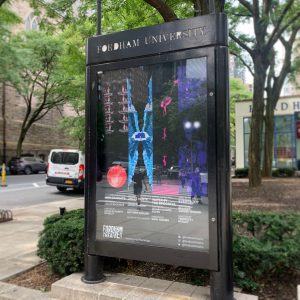
In another virtual classroom, Peggy Andover, Ph.D., associate professor of psychology, is teaching undergraduates at Rose Hill how the laws of the environment shape behavior in an asynchronous class called Learning Laboratory. Andover said that platforms like Panopto, which transcribe her lessons, can make it easier for students to look for specific information.
“Let’s say you’re studying for an exam, and you see the word ‘contiguity’ in your notes, and you don’t remember what it means. You don’t have to watch the entire lecture again—you can search for ‘contiguity’ and see the slides and the portion of the lecture where we were talking about it,” Andover said.
Graduate students teaching in the psychology program are also using Pear Deck to make their virtual classrooms more engaging on Google Slides, she said.
“You have this PowerPoint that’s being watched or engaged in asynchronously, but [Pear Deck] allows you to put in interactive features,” including polls and student commentary, she said.
“Our grad students found it’s a way to really get that engagement that they would potentially be missing when we went to online learning.”
Learning from Classmates
Aaron Saiger, a professor at the Law School, made several adjustments to Property Law, a required class for all first-year law students. Instead of meeting in person twice a week for two hours, his class of 45 students meets on Zoom three times a week for 90 minutes, an acknowledgment that attention spans are harder to maintain on Zoom.
The content is the same, but the way he teaches it had to change. While he was able to record four classes’ worth of lectures to share asynchronously, that wasn’t an option for everything.
“I’m spending less time talking to students one-on-one while everyone else listens, which is the classic law school teaching mode; we call it the Socratic method,” he said. “Everyone else is supposed to imagine that they’re the person being called on.”
Saiger’s solution is having students share two-sentence answers to questions in the Zoom chat function to gauge what everyone’s thinking about a topic, having them do more group work, and leaning more on visual material.
“The difficulties are not insubstantial, but I think we are meeting the challenges and finding a few offsetting advantages that will make it a good semester for everyone.”
Getting Creative with Lab Work
Stephen Holler, Ph.D., associate professor of physics, holds most of his experimentation class in person, with a few students attending remotely.
The in-person group is working on a hands-on solar project that allows them to learn about the material, electric, programming, and optical components of physics.
Students who are attending the class remotely are doing related mathematical work as a part of their semester-long project.
“One student is studying interference coding in optics, so I have him looking at designs in a paper,” he said. “He’s learning all the underlying physics for what goes into a portion of these mirrors that are used in laser systems.”
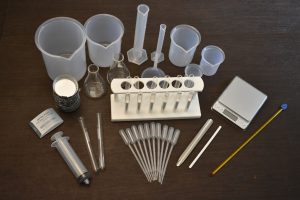
His students will be conducting experiments at home instead, using kits he’s sent them.
Christopher Koenigsmann, Ph.D., assistant professor of chemistry, is sending lab kits to the students in his general chemistry class so they can conduct experiments from home.
“We were between a rock and hard place—you can’t have the kids in the lab, and at the same time, we can’t not have some kind of hands-on,” he said.
The kits will allow students to participate in labs virtually through a Zoom webinar with their professor, as well as in breakout rooms with their lab teams.
“We adapted as many of our experiments as we could to just use simple household chemicals that are all completely safe,” he said.
Elizabeth Thrall, Ph.D., an assistant professor of physical and biophysical chemistry, likewise sent a kit to students that they can use to build a spectrometer. Students can build it out of Legos, using a DVD and a light source to create different wavelengths of light. They capture them using their computer’s webcam which processes the data. They will then design an experiment that everyone in the class will conduct.
“Designing an experiment so that you learn something, that answers the question you set out to answer, and gives a protocol that someone else can follow so they can get the same results that you got, is really at the heart of what it is to do scientific research,” she said.
—Taylor Ha, Kelly Kultys, and Tom Stoelker contributed reporting.
]]>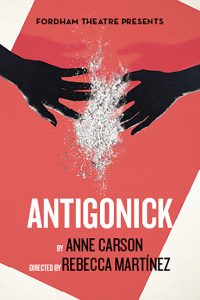 That’s the conundrum of Fordham Theatre’s 2018/2019 mainstage season, which opens on October 4 with a contemporary translation of Sophocles’ Antigone. Director Matthew Maguire said that since American politics and culture is in the same state of chaos as it was last year, this was the right time to ditch formal themes, such as last years’ questions of American identity, and Fordham’s outsider roots the year before.
That’s the conundrum of Fordham Theatre’s 2018/2019 mainstage season, which opens on October 4 with a contemporary translation of Sophocles’ Antigone. Director Matthew Maguire said that since American politics and culture is in the same state of chaos as it was last year, this was the right time to ditch formal themes, such as last years’ questions of American identity, and Fordham’s outsider roots the year before.
“I got tired of season titles that felt like rhetoric; I couldn’t think of a better title for this year’s season that was substantially different from last year’s,” he said.
Given all that has happened in the last year, Maguire said he felt it was necessary to be smarter and savvier in how plays were selected. Each one is in some way a resistance to a vision of the United States as a country that is nationalist, xenophobic, and dominated exclusively by heterosexual white Christians, he said. The works do share a common thread though: What happens when radical change disrupts to heretofore stable systems?
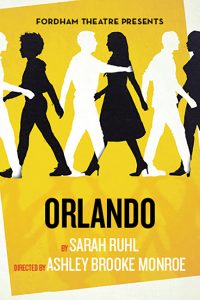 Antigonick, which was chosen with the November elections in mind, asks what happens when a young woman defies rigid state power. Orlando, a dreamy adaptation of Virginia Woolf’s novel of the same name, asks what happens when a man is suddenly transformed into a woman. Satellites is set in a gentrifying Brooklyn neighborhood and features a multi-racial couple struggling to answer the question, what happens when cultures clash?
Antigonick, which was chosen with the November elections in mind, asks what happens when a young woman defies rigid state power. Orlando, a dreamy adaptation of Virginia Woolf’s novel of the same name, asks what happens when a man is suddenly transformed into a woman. Satellites is set in a gentrifying Brooklyn neighborhood and features a multi-racial couple struggling to answer the question, what happens when cultures clash?
The season ends with Mr. Burns, a musical set in the aftermath of an unspecified apocalyptic event. The survivors bond over a shared love of The Simpsons episode Cape Feare, and eventually build a tradition around staged reenactments of it. It is, Maguire said, an attempt to answer the question, ‘What happens if people have to rebuild their culture through the art they make?’
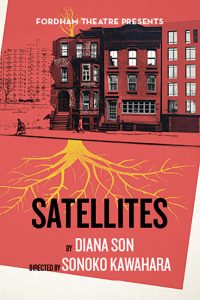 “It’s a wonderfully dual question because it says something to the theater makers about the importance of what that they do, but it also says something to audience about how story telling can bind a culture, and how the stories that are meaningful to them will protect them or divide them,” he said.
“It’s a wonderfully dual question because it says something to the theater makers about the importance of what that they do, but it also says something to audience about how story telling can bind a culture, and how the stories that are meaningful to them will protect them or divide them,” he said.
As is the Fordham Theatre program’s custom, students played a major role in choosing the plays. William Recce, a senior playwriting major at Fordham College at Lincoln Center, participate in the five forums, and made a strong case for Mr. Burns inclusion. He’d been a fan of it since it debuted in 2012, partly because of its realistic depiction of the power of pop culture. It also resonated on a deeply personal level, he said, because it’s ultimately about collaboration and making art in trying times.
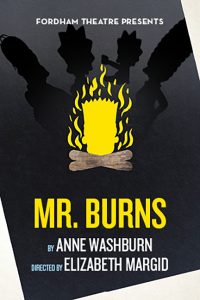 “For a theater program that is all about collaboration and building something from the ground up and sifting through the ashes of our everyday world and trying to find something beautiful, I thought, it’s a perfect piece,” he said.
“For a theater program that is all about collaboration and building something from the ground up and sifting through the ashes of our everyday world and trying to find something beautiful, I thought, it’s a perfect piece,” he said.
Ultimately, Maguire said he hopes the plays are a positive means of resistance. For those who embrace xenophobia, racism, and nationalism, they’re meant to show there’s another way. For those who already embrace an inclusive vision of the country, they’re meant to be nourishing. Either way, they should make people think, and ideally take action.
“Plays should change people’s lives. You should walk out of a theater, and something should make you decide, ‘I think I’m going to do this,’ he said.
“If it doesn’t change your life, we have not done our job.”
The plays include:
Antigonick by Ann Carson, directed by Rebecca Martínez
Oct. 4, 5, 6, 10, 11, 12
Orlando by Sarah Ruhl, directed by Ashley Brooke Monroe
Nov. 7, 8, 9, 15, 16, 17
Satellites by Diana Son, directed by Sonoko Kawahara
Feb. 21, 22, 23, 27, 28, March 1
Mr. Burns, by Anne Washburn, directed by Elizabeth Margid
April 10, 11, 12, 24, 25, 26, 27
]]>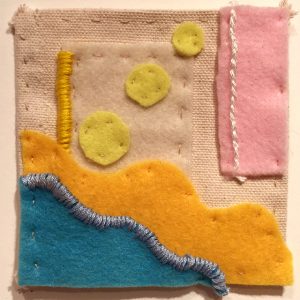
The ensemble work is now featured in an exhibition that runs through Sept. 30 at the Ildiko Butler Gallery on the Lincoln Center campus, titled What This Journey Breeds. The project was not connected to any class, though students met in seminar with artist Amie Cunat, FCLC ’08, Fordham artist-in-residence Carleen Sheenan, and photographer Anibal Pella-Woo, lecturer in the visual arts program.
The students collaborated with the Refugee and Immigrant Fund (RIF) on the project. With concentrations in graphic design, painting and drawing, photography, architecture, and film and video, the artists put a human face to an abstract subject in this unnerving, yet hopeful, exhibition.
David Quateman, FCLC ’16, and rising junior Eamon Redpath interviewed several refugees in a short video—including Julian, a gay man from Malaysia who describes having a gun pointed at his face by the Malaysian police.
Fordham’s Institute of International Humanitarian Affairs (IIHA) sponsored several events. Students met with a lawyer from Catholic Charities, civil servants, fellow students working with refugees, and other artists that make socially conscious artwork.
Students took field trips to Brooklyn Grange, where RIF brings refugees to rooftop gardens as a respite from the stressful process of seeking asylum in the United States. Once there, James McCracken Jr., PCS ’16, shot stark black and white portraits of the asylum seekers.
A video diptych by rising senior Anabelle Declement juxtaposes two scenes: one that’s a mashup of testimonials used in the documentary, and another that presents the natural serenity of Brooklyn Grange.
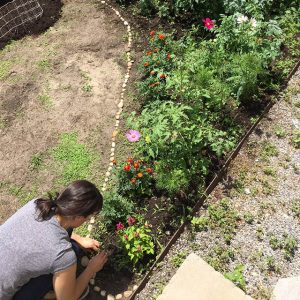
The grange inspired a range of other works, including plant sculptures by rising senior Emma Kilroy and a fruit- and vegetable-stained textile created by rising senior Francesca Aton. The grange also inspired a second garden on the Lincoln Center campus designed and built by Danielle Serigano, FCLC ’16. All fruits and vegetables harvested at summer’s end will be donated to RIF. Serigano also maps a metaphorical journey through the campus garden, presented on post cards at the gallery. Student and faculty volunteers will maintain the garden through the summer.
Through architectural renderings created by Nicholas Eliades, FCRH ’16, one can imagine future meeting spaces for RIF clients. Rising senior Margaret McCauley’s collages include text, culled from the interviews, expressing why such a safe space is needed.
“Mommy thank God,” reads one. “If you didn’t leave for America, now you would be dead.”
]]>The new group—now called the Fordham Alumni Company—is gearing up for an exciting summer celebrating alumni contributions to the arts. The celebration begins at the Lincoln Center campus on Monday, June 17, with the group’s ReBoot Launch Party, and continues with two festival weekends at the Lincoln Center campus that will bring together multiple generations of alumni across all artistic disciplines.
The “Fresh Art” Weekend (Aug. 2 to 4) will highlight works that are in development—“live” projects such as new play readings and dance workshops.
The “Canned Art” Weekend (Aug. 9 to 11) will feature completed works—primarily film projects of all types, lengths, and genres.
The company is seeking submissions from all alumni who have a theatre, dance, or film project that they’d like to present at this year’s festivals.
Submission requirements are as follows:
Film projects: A brief synopsis plus two DVDs or a digital copy of your complete project.
Theatre projects: A brief synopsis, a 15-page sample, and a full copy of the script.
Dance and other projects: A brief synopsis outlining the goals of the project and any supporting materials that help describe what you would like to present—for example, photos, artwork, video samples of choreography, etc.
Please send all submission materials to [email protected]. Or mail them to:
Fordham University
Department of Theatre and Visual Arts, Room 423
Attn: Elizabeth Margid
113 West 60th Street
New York, NY 10023
The submission deadline is May 31, 2013.
For more information about the Fordham Alumni Company, the June 17 ReBoot Launch Party, and the summer festival weekends, visit the group’s Facebook page (www.facebook.com/FordhamAlumniCompany).
]]>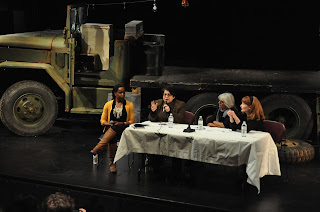
Yet the mineral used to manufacture these devices has contributed to years of war in the Congo, where conflict over natural resources continues to decimate the land as well as its citizens.
Helping to shed light on the issue, Fordham’s Theatre Program is running the 2009 Pulitzer Prize winner Ruined as the third show of its 2012-13 mainstage season. Written by Lynn Nottage, Ruined is the story of four women struggling to survive in war-torn Eastern Congo, a region rife with abuses of human rights, especially sexual violence.
On Feb. 22, a panel of Fordham professors gathered on the Pope Auditorium stage for a discussion on the complex issues raised by Nottage’s play.
The panel featured:
- Moderator Aimee Cox, Ph.D., assistant professor of performance and African and African American studies;
- Aseel Sawalha, Ph.D., associate professor of anthropology;
- Fawzia Mustafa, Ph.D., associate professor of English and African and African American studies;
- And Evelyn Bush, Ph.D., associate professor of sociology.
With the militaristic set of Ruined providing a sinister backdrop for the panel, Cox explained that Eastern Congo provides 70 percent of the world’s supply of coltan, the mineral used in many electronic devices. The abundance of the mineral makes the Congo a magnet for civil conflict and corporate greed.
“In Ruined, we are compelled to question how a country that has been described as ‘the rape capital of the world’ becomes so through transnational capital flow and the exploitation of natural resources,” Cox said. “We are asked to consider how human life becomes devalued… [in part]through Western interest that believes that the right to trade is more powerful or valuable than the right to live.”
That capitalist mindset, Bush said, often pervades political discussion, seeps into media coverage, and then percolates down into public opinion. And though talk of independence from foreign oil has made headway in public discourse, the prospect of a similar outcome with coltan is dim.
“Coltan is the new oil,” Bush said. “It’s something that we’re building the entire infrastructure of our society around, so the stakes are incredibly high… And because of that, activism or movements in response are going to be very difficult.”
Meanwhile, as the war over resources drags on, civilians suffer. Hundreds of thousands of women have been caught up between warring factions since the conflict began in 1996. For Congolese women and girls of all ages, the threat of sexual violence is constant.
“In most wars, the rape of women is not for pleasure—it’s to punish the nation,” Sawalha said. “By contaminating the bodies of these women, the new generation that’s going to be produced because of it is contaminated as well.”
It leads us to ask why, in the face of overt violence, does the world not intervene, the panelists asked.
“We know an awful lot about what has happened and why,” Mustafa said. “But it continues. Nothing that we understand about this has stopped it from happening, even with the publicity, even with advocacy. It brings us back to the question of who benefits.
“You can pinpoint two culprits,” she continued. “One is the market as it functions right now, and the other is the ways in which patriarchy has become so horribly skewed in Africa.”
The panelists acknowledged that the evening’s discussions, as well as the play itself, do little to effect more than awareness and advocacy. Nevertheless, that is where justice must begin.
“It’s not about easy answers or coming to resolutions, but grappling with the various questions we find in the play,” Cox said.
Ruined continues this week on Feb. 27 through March 1 at 8 p.m. in Pope Auditorium. A post-show talkback exploring the artistic choices behind the play will take place on Feb. 28 in Pope Auditorium.
On April 10 and 11, Ruined playwright Lynn Nottage will be visiting both the Lincoln Center and Rose Hill campuses to discuss her play.
For more information about Ruined and the Theatre Program’s mainstage season,read the article in Inside Fordham.
]]>
The filmmaker is on fire in his former hometown of Toronto, too, where his films will be featured on Feb. 9 and Feb. 10 at The 8 Fest, a weekend festival for Super 8, 8mm, 9.5mm and other small-gauge films. On Feb. 9, McLaren’s early work will be featured with the work of Andy Warhol and new artists in a session co-presented with Canadian Filmmakers Distribution Centre (CFMDC). On Feb. 10 he will be a featured speaker. (photo: mikehoolboom.com)
After receiving the award, Hickey, who stars as Felix Turner in the play, said his Tony win was “the proudest moment in [his]career.”
During his acceptance speech, Hickey also thanked Linney for always getting him to “the stage door on time.”
After earning his bachelor’s degree in English at Fordham College at Lincoln Center in 1985, Hickey trained at the Juilliard School. He made his Broadway debut in 1995 in the original cast of Terrence McNally’s Tony Award-winning play Love! Valour! Compassion! His other Broadway credits include Cabaret, The Crucible andMary Stuart.
He’s also appeared in the films The Ice Storm, The Taking of Pelham 1 2 3 andTransformers 2: Revenge of the Fallen, and has landed various roles on NBC’s Law & Order franchise.
– Miles Doyle

The Holocaust Memorial Art Exhibit will feature paintings by Marilyn Honigman, chair of the Fine Arts Department at Fordham Preparatory School. The exhibit will depict pictorial impressions on the Holocaust.
Honigman’s paintings have been exhibited at the Polish Consulate, the Cathedral of St. John the Divine, the Corcoran Gallery, the Blue Mountain Gallery, and other group exhibitions.
The art exhibit is part of the Fordham Forum Spring Series and is co-sponsored by Campus Ministry.
